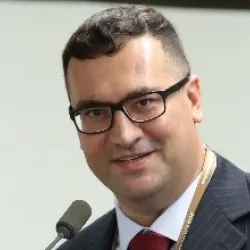Unlocking new horizons in reporting, forecasting and policy making: big data and data science
Unlocking new horizons in reporting, forecasting and policy making: big data and data science
Unlocking New Horizons in Reporting, Forecasting and Policymaking: Big Data and Data Science
Date: March 12–14, 2024
Time: 10am-1pm (EDT) | 2pm-5pm (GMT) | 3pm - 6pm (CET) I 10pm-1am (SGT)
Location: Virtual
Chair and speakers

Per Nymand-Andersen
Emeritus adviser
European Central Bank
Per Nymand-Andersen has over 25 years of Central Banking Experiences and was part of creating and developing the European Central Bank from scratch. Per has developed his expertise in banking and financial markets, fintech, data science, communications, securities settlement systems, statistics and Management.
Per holds several Fintech/data science Advisor Board positions in private and simi-public organisations. Per is a Lecture at Goethe-Universität Frankfurt and is a frequent speaker at international events and author of several publications/articles regarding financial markets, data science, communication and statistics. His recent renown book “Data science in Economics and Finance for Decision Makers” was published by Riskbooks.com.
Prior to joining the ECB, he provided market research consultancy services for the European Commission, Luxembourg.
Per has an MBA in Economics and Management Science from Copenhagen Business School, Denmark and has a Fintech certificate from Harvard University.
Per speaks four languages (English, German, French and Danish).
Further details: https://www.linkedin.com/in/per-nymand-andersen-81609913

Fabiola Herrera
Deputy manager systems and innovation
Central Bank of the Dominican Republic
Academia and work areas. BA Degree in Computer Science, Summa cum Laude; Postgraduate degrees in Functional Analysis, Analysis and System Design, Digital Transformation (MIT). Her work areas include Payment Systems, IT, Cybersecurity, technological innovation and Fintechs, in both regulatory and operational aspects. She is also very active in financial inclusion and financial education.
Professional life. Since 1981, she worked in the private banking sector for 11 years in the IT area. She joined the Central Bank of the Dominican Republic in January 1996 in the Systems and Technology Department.
In January 2006 she was appointed Director of the new Department of Payment Systems, which, among other functions, coordinated the Reform Project of the Payment System of the Dominican Republic (SIPARD), including the implementation of Instant Payments nationwide. Also, was the leader in the process of the interconnection of the national payment systems of the Central America countries (SIPA), a network for cross-border payments that went live in 2011.
She is currently Deputy Manager of Systems and Technological Innovation, supervising the Departments of Payment Systems, Systems and Technology, and Cyber and Information Security (Department that she was instructed to create and develop in 2018). As such, is the promoter of the national legal framework for cybersecurity in the financial sector, and the creation of a cyber incident response center for this sector (Financial CSIRT). Also, she has recently managed several projects involving big data and risk management.
Locally, Ms. Herrera is a member of the National Table for Digital Economy, hosted by the Ministry of the Presidency, where the Central Bank has two important projects: the Financial Innovation HUB, and the National Strategy for Financial Inclusion. Besides, she represents the Governor of the Central Bank at the National Cybersecurity Council.

Bruno Tissot
Head of statistics and research support
Bank for International Settlements
Bruno Tissot is the Head of statistics and research support at the BIS and Head of the secretariat of the Irving Fisher Committee on central bank statistics (IFC). He has been working at the BIS since 2001, as Senior economist and Secretary to the markets committee of central banks in the monetary and economic department and then as the Adviser to the general manager and Secretary to the BIS executive committee. Between 1994 and 2001 he worked for the French Ministry of Finance. He is currently Head of BIS statistics and research support and is a graduate from École Polytechnique (Paris) and of the French Statistical Office INSEE.

Julapa Jagtiani
Senior economic advisor and economist
Federal Reserve Bank of Philadelphia
Julapa Jagtiani joined the Federal Reserve Bank of Philadelphia as a special advisor in the Supervision, Regulation, and Credit Department in 2008. In this role, she has conducted research and participated in or led several supervisory policy and implementation projects, including CCAR stress testing, recovery and resolution plans, and Basel II qualification reviews for large and complex financial institutions, with a focus on the use of quantitative methods and models for risk management. She is also a fellow member of the Wharton Financial Institutions Center and a Central Bank Research Fellow at the Bank for International Settlements. A career highlight has been contributing to the discussion around the potential impacts of fintech and considerations for shaping future fintech regulations that protect consumers and encourage innovation.
Previously, Jagtiani was a senior economist at the Federal Reserve Banks of Kansas City and Chicago. Before joining the Federal Reserve System in 1998, she was associate professor of finance at Baruch College and assistant professor of finance at Syracuse University.
Jagtiani has made significant contributions in the fields of financial institutions, financial markets, and bank supervision and regulation. She publishes research in top finance journals, organizes conferences to connect regulators with academics and industry leaders, and is a frequent speaker at conferences and forums. Her research areas include banking policy-related issues, including too big to fail, systemic risk and financial stability, Basel II capital regulations, mergers and acquisitions, mortgages and home equity issues, and credit risk models and management. Her more recent research has focused on issues related to fintech, use of alternative data and AI/ML in credit decisions, small business lending, and community bank mergers.
Jagtiani has been active in the community and has served on the board of directors and finance committees at various organizations, including the Leadership Council Board of Directors for the American Red Cross, the Center for Practical Bioethics, and the Parents Council at Johns Hopkins University; she also belongs to the Union League of Philadelphia. Jagtiani has a Ph.D. in finance and an M.B.A. from New York University’s Stern School of Business, where she held the Rockefeller Foundation Fellowship.

Paola Cerchiello
Associate professor
University of Pavia
Paola mainly focuses on methodological statistics and data analysis: she is currently working on text data models, systemic risk, financial technologies (fintech), big data analysis, ordinal variables, spatio-temporal models. She collaborates with the Bank of Italy on a Big Data analysis project and she was a member of ‘Big Data Group’ at Deutsche Bundesbank, Frankfurt, Germany. She is member of the board of ‘Statistics and Data Science’ group of the Italian Statistics Association. She is associate of the UCL Centre for Blockchain Technology, which is the nucleus for DLT and Blockchain research and engagement across eight different departments at UCL and for its Research and Industry Associate network.
She is Associated researcher of RiskLab (http://risklab.fi/), RiskLab Finland is a research group at Arcada and a research laboratory of Infolytika Ventures, with the objective to study and develop the fields of risk analysis through machine learning and visual analytics. She is advisor of Initial Coin Offering of Blufolio AG, Switzerland.
She has been appointed as Expert and Project Evaluator from the Fund for Scientific Research-FNRS (F.R.S.-FNRS), a funding agency located in Brussels in Belgium and as reviewer of the ‘Science Foundation Ireland - SFI’, in Dublin, Ireland.
She serves as referee for several international journals: The Journal of Royal Statistical Society (Series A), Scientometrics, Expert Systems with Applications, Neurocomputing, European Journal of Operation Research, Statistical Analysis and Data Mining, the Journal of Big data, Small Business Economics Journal, Journal of Classification, Statistical Methods and Applications, WIREs Data Mining and Knowledge Discovery, Information Processing and Management, Social Network Analysis and Mining, Public Management Review, The Journal of Operational Risk, Communication and Statistics, British Journal of Mathematics & Computer Science.

Dr. Thomas Gottron
Principal data science expert
ECB

David Bolder
Head of model risk function
World Bank
David Jamieson Bolder is currently head of the World Bank Group's (WBG) model-risk function. Prior to this appointment, he provided analytic support to the Bank for International Settlements' (BIS) treasury and asset-management functions and worked in quantitative roles at the Bank of Canada, the World Bank Treasury, and the European Bank for Reconstruction and Development. He has authored numerous papers, articles, and chapters in books on financial modelling, stochastic simulation, and optimization. He has also published a comprehensive book on fixed-income portfolio analytics. His career has focused on the application of mathematical techniques towards informing decision-making in the areas of sovereign-debt, pension-fund, portfolio-risk, and foreign-reserve management.

Tsenddorj Dorjpurev
Project lead | Senior economist - research and statistics department
Central Bank of Mongolia
With over 10 years of experience in economic research and analysis, Tsenddorj leads a team of data engineers and data scientists at the Research and Statistics Department of the Central Bank of Mongolia. He has a master’s degree in finance and credentials in general equilibrium models and macroeconomic management. His core competencies include econometric methods, economic models, data analysis, and BI tools.
Tsenddorj has successfully led and delivered many economic research projects that informed policy decisions and provided insights to senior management and external stakeholders. Some of his achievements include improving the accuracy of inflation and GDP projections by 16.3%, reducing data errors by 56%, increasing potential data availability by 800 folds, and publishing papers and reports on macroeconomic issues. He is passionate about macroeconomics, development economics, and environmental economics, and seeks to apply his skills and expertise to contribute to sustainable development. He also serves as a steering committee member at the EBRD Central Asia Women in Business Programme, where he provides strategic guidance and support to promote gender equality and improve the gender impact of the EBRD’s investments.

Juri Marcucci
Economist
Bank of Italy
Juri Marcucci holds a PhD in Economics from the University of California, San Diego. His doctoral thesis was on financial econometrics, under the supervision of Professor Robert Engle (winner of the 2003 Nobel Memorial Prize in Economic Sciences) and it focused on the predictive ability of Regime-Switching GARCH models and common features in volatility. He lectured at the University of Bologna, and Tor Vergata University of Rome and he is currently lecturing a course on “Data-Driven Economics” at the Sapienza University of Rome. He has been visiting scholar at the Federal Reserve Bank of Boston, University of California San Diego and Universitat Pompeu Fabra. He is the organizer of the Italian Summer School of Econometrics on behalf of the Italian Econometric Association (SIDE). He has been the Bank of Italy’s member of the Big Data Committee at the Italian National statistical institute. He has been guest editor of the journals Econometrics and the International Journal of Forecasting. He is co-organizing a series of webinars on Applied Machine Learning, Economics, and Data Science (AMLEDS).
He has worked at the Bank of Italy since 2004 where he has coordinated the task force on Big Data and Machine Learning since 2016. He is now working in the Research Data Center and Innovation Lab in the DG Economics, Statistics and Research. His research interests are on Big Data, Text Mining, forecasting and applied econometrics.
His work appeared in the J. of Econometrics, International J. of Forecasting, Studies in Nonlinear Dynamics & Econometrics, J. of Economics and Business, J. of International Financial Markets, Institution & Money, International Review of Financial Analysis.

Ramunas Baravykas
Director of data and statistics department
Bank of Lithuania
Ramūnas Baravykas, the Chief Data Officer at the Bank of Lithuania, is spearheading the transformation of the data management framework by integrating cutting-edge RegTech solutions into the data value chain. Since the start of 2021, he has held the position of Director of the Data and Statistics department.
With over 17 years of experience in the financial sector supervision, he has served in various capacities, including Head of Risk Modelling Division, Advisor to the Executive Director, and Head of Digitalisation and Advanced Analytics. During this tenure, he successfully implemented a risk-based supervision model, led the implementation of a core supervisory information system, and played a pivotal role in numerous digitalization initiatives at the Bank of Lithuania. Prior to joining the Bank of Lithuania, Mr. Baravykas served as the Deputy Chairman and Head of Information Analysis Division at the Insurance Supervisory Commission of the Republic of Lithuania.

Edita Lukaševičiūtė
Head of data governance
Bank of Lithuania
Edita is currently the Head of Data Governance Unit at the Bank of Lithuania. She is one of key persons behind the Bank’s Data Management Strategy. She is working on defining and setting the new data governance framework in the Bank of Lithuania.
Edita has over 15 years experience in the banking sector, from which 6 years in central banking. Before being appointed as Head of Data Governance Unit, Edita worked on the implementation of the new national Central Credit Register and on the project of analytical credit datasets (AnaCredit). Before that, she was heading the Loan Administration Unit in one of the small private banks in Lithuania.
Agenda
The foundations of big data and data Science
14:00 – 14:15
Course introduction and participant welcome
11:00 - 11:15
- Introductions and welcome from the chair
- Overview of the training course and key themes
- Discussion of delegate expectations and particular areas of interest
|
Per Nymand-Andersen has over 25 years of Central Banking Experiences and was part of creating and developing the European Central Bank from scratch. Per has developed his expertise in banking and financial markets, fintech, data science, communications, securities settlement systems, statistics and Management. Per holds several Fintech/data science Advisor Board positions in private and simi-public organisations. Per is a Lecture at Goethe-Universität Frankfurt and is a frequent speaker at international events and author of several publications/articles regarding financial markets, data science, communication and statistics. His recent renown book “Data science in Economics and Finance for Decision Makers” was published by Riskbooks.com. Prior to joining the ECB, he provided market research consultancy services for the European Commission, Luxembourg. Per has an MBA in Economics and Management Science from Copenhagen Business School, Denmark and has a Fintech certificate from Harvard University. Per speaks four languages (English, German, French and Danish). Further details: https://www.linkedin.com/in/per-nymand-andersen-81609913 |
14:15 – 15:00
Fintech and new data sources in economics and finance
14:15 - 15:00
- Big Data and central banking – purpose and use
- How central banks think about data & statistics
- Data Science, Fintech, and use of social media data
- Quality and transparency of new data sources
|
Per Nymand-Andersen has over 25 years of Central Banking Experiences and was part of creating and developing the European Central Bank from scratch. Per has developed his expertise in banking and financial markets, fintech, data science, communications, securities settlement systems, statistics and Management. Per holds several Fintech/data science Advisor Board positions in private and simi-public organisations. Per is a Lecture at Goethe-Universität Frankfurt and is a frequent speaker at international events and author of several publications/articles regarding financial markets, data science, communication and statistics. His recent renown book “Data science in Economics and Finance for Decision Makers” was published by Riskbooks.com. Prior to joining the ECB, he provided market research consultancy services for the European Commission, Luxembourg. Per has an MBA in Economics and Management Science from Copenhagen Business School, Denmark and has a Fintech certificate from Harvard University. Per speaks four languages (English, German, French and Danish). Further details: https://www.linkedin.com/in/per-nymand-andersen-81609913 |
15:00 – 15:10
Break
12:45 - 13:00
15:10 – 16:00
Central banking collaborations on data science/big data
15:10 - 16:00
- Big data and central banks
- Opportunities
- Organising data work
- Challenges
- Policy issues with handling and using big data
Bruno Tissot is the Head of statistics and research support at the BIS and Head of the secretariat of the Irving Fisher Committee on central bank statistics (IFC). He has been working at the BIS since 2001, as Senior economist and Secretary to the markets committee of central banks in the monetary and economic department and then as the Adviser to the general manager and Secretary to the BIS executive committee. Between 1994 and 2001 he worked for the French Ministry of Finance. He is currently Head of BIS statistics and research support and is a graduate from École Polytechnique (Paris) and of the French Statistical Office INSEE.
16:00 – 16:10
Break
12:45 - 13:00
16:10 – 17:00
Strengthening your data science lab and governance
16:10 - 17:00
- The principles for successful data science and case studies
- Opportunities: identify the benefits for your organisation
- How do you make sure everyone in the organisation can access the data they need?
14:00 – 14:45
Overcoming the main challenges of collecting and making sense of big data
14:00 - 14:45
- Working with big data
- Opportunities for central banks
- Organising big data work
- Challenges & policy issues with handling and using big data
Julapa Jagtiani joined the Federal Reserve Bank of Philadelphia as a special advisor in the Supervision, Regulation, and Credit Department in 2008. In this role, she has conducted research and participated in or led several supervisory policy and implementation projects, including CCAR stress testing, recovery and resolution plans, and Basel II qualification reviews for large and complex financial institutions, with a focus on the use of quantitative methods and models for risk management. She is also a fellow member of the Wharton Financial Institutions Center and a Central Bank Research Fellow at the Bank for International Settlements. A career highlight has been contributing to the discussion around the potential impacts of fintech and considerations for shaping future fintech regulations that protect consumers and encourage innovation.
Previously, Jagtiani was a senior economist at the Federal Reserve Banks of Kansas City and Chicago. Before joining the Federal Reserve System in 1998, she was associate professor of finance at Baruch College and assistant professor of finance at Syracuse University.
Jagtiani has made significant contributions in the fields of financial institutions, financial markets, and bank supervision and regulation. She publishes research in top finance journals, organizes conferences to connect regulators with academics and industry leaders, and is a frequent speaker at conferences and forums. Her research areas include banking policy-related issues, including too big to fail, systemic risk and financial stability, Basel II capital regulations, mergers and acquisitions, mortgages and home equity issues, and credit risk models and management. Her more recent research has focused on issues related to fintech, use of alternative data and AI/ML in credit decisions, small business lending, and community bank mergers.
Jagtiani has been active in the community and has served on the board of directors and finance committees at various organizations, including the Leadership Council Board of Directors for the American Red Cross, the Center for Practical Bioethics, and the Parents Council at Johns Hopkins University; she also belongs to the Union League of Philadelphia. Jagtiani has a Ph.D. in finance and an M.B.A. from New York University’s Stern School of Business, where she held the Rockefeller Foundation Fellowship.
14:45 – 15:25
The model universe of machine learning and statistics
14:45 - 15:25
- Big Data versus Machine Learning
- Introduction to Neural Networks
- Optimization and Regularization
- Early Applications of Machine Learning in Finance
David Jamieson Bolder is currently head of the World Bank Group's (WBG) model-risk function. Prior to this appointment, he provided analytic support to the Bank for International Settlements' (BIS) treasury and asset-management functions and worked in quantitative roles at the Bank of Canada, the World Bank Treasury, and the European Bank for Reconstruction and Development. He has authored numerous papers, articles, and chapters in books on financial modelling, stochastic simulation, and optimization. He has also published a comprehensive book on fixed-income portfolio analytics. His career has focused on the application of mathematical techniques towards informing decision-making in the areas of sovereign-debt, pension-fund, portfolio-risk, and foreign-reserve management.
15:25 – 15:35
Break
15:15 - 15:45
15:35 – 16:15
Text mining: applications in economic analysis (and text analysis)
15:35 - 16:15
- Taxonomy of data derived from textual databases
- Overview of tools and methods for their systematic analysis
- Examples of applications in predictive models
- Case study: textual analysis for monitoring macroeconomic developments
Paola mainly focuses on methodological statistics and data analysis: she is currently working on text data models, systemic risk, financial technologies (fintech), big data analysis, ordinal variables, spatio-temporal models. She collaborates with the Bank of Italy on a Big Data analysis project and she was a member of ‘Big Data Group’ at Deutsche Bundesbank, Frankfurt, Germany. She is member of the board of ‘Statistics and Data Science’ group of the Italian Statistics Association. She is associate of the UCL Centre for Blockchain Technology, which is the nucleus for DLT and Blockchain research and engagement across eight different departments at UCL and for its Research and Industry Associate network.
She is Associated researcher of RiskLab (http://risklab.fi/), RiskLab Finland is a research group at Arcada and a research laboratory of Infolytika Ventures, with the objective to study and develop the fields of risk analysis through machine learning and visual analytics. She is advisor of Initial Coin Offering of Blufolio AG, Switzerland.
She has been appointed as Expert and Project Evaluator from the Fund for Scientific Research-FNRS (F.R.S.-FNRS), a funding agency located in Brussels in Belgium and as reviewer of the ‘Science Foundation Ireland - SFI’, in Dublin, Ireland.
She serves as referee for several international journals: The Journal of Royal Statistical Society (Series A), Scientometrics, Expert Systems with Applications, Neurocomputing, European Journal of Operation Research, Statistical Analysis and Data Mining, the Journal of Big data, Small Business Economics Journal, Journal of Classification, Statistical Methods and Applications, WIREs Data Mining and Knowledge Discovery, Information Processing and Management, Social Network Analysis and Mining, Public Management Review, The Journal of Operational Risk, Communication and Statistics, British Journal of Mathematics & Computer Science.
16:15 – 17:00
Reporting frameworks: using data management frameworks for risk-based reporting
16:15 - 17:00
- Strategies for extracting, standardising, and consolidating analytical data
- How to develop regulatory requirements for better transparency
- How can data quality be improved for the future?
- contributing to the challenges in reforming data management for central banks
Academia and work areas. BA Degree in Computer Science, Summa cum Laude; Postgraduate degrees in Functional Analysis, Analysis and System Design, Digital Transformation (MIT). Her work areas include Payment Systems, IT, Cybersecurity, technological innovation and Fintechs, in both regulatory and operational aspects. She is also very active in financial inclusion and financial education.
Professional life. Since 1981, she worked in the private banking sector for 11 years in the IT area. She joined the Central Bank of the Dominican Republic in January 1996 in the Systems and Technology Department.
In January 2006 she was appointed Director of the new Department of Payment Systems, which, among other functions, coordinated the Reform Project of the Payment System of the Dominican Republic (SIPARD), including the implementation of Instant Payments nationwide. Also, was the leader in the process of the interconnection of the national payment systems of the Central America countries (SIPA), a network for cross-border payments that went live in 2011.
She is currently Deputy Manager of Systems and Technological Innovation, supervising the Departments of Payment Systems, Systems and Technology, and Cyber and Information Security (Department that she was instructed to create and develop in 2018). As such, is the promoter of the national legal framework for cybersecurity in the financial sector, and the creation of a cyber incident response center for this sector (Financial CSIRT). Also, she has recently managed several projects involving big data and risk management.
Locally, Ms. Herrera is a member of the National Table for Digital Economy, hosted by the Ministry of the Presidency, where the Central Bank has two important projects: the Financial Innovation HUB, and the National Strategy for Financial Inclusion. Besides, she represents the Governor of the Central Bank at the National Cybersecurity Council.
14:00 – 14:45
Applying data science in economics and forecasting demand
14:00 - 14:45
- Data science models for large datasets
- Using predictive models in macroeconomics
- Case study: working with big data, models, software and examples from Bank of Italy
Juri Marcucci holds a PhD in Economics from the University of California, San Diego. His doctoral thesis was on financial econometrics, under the supervision of Professor Robert Engle (winner of the 2003 Nobel Memorial Prize in Economic Sciences) and it focused on the predictive ability of Regime-Switching GARCH models and common features in volatility. He lectured at the University of Bologna, and Tor Vergata University of Rome and he is currently lecturing a course on “Data-Driven Economics” at the Sapienza University of Rome. He has been visiting scholar at the Federal Reserve Bank of Boston, University of California San Diego and Universitat Pompeu Fabra. He is the organizer of the Italian Summer School of Econometrics on behalf of the Italian Econometric Association (SIDE). He has been the Bank of Italy’s member of the Big Data Committee at the Italian National statistical institute. He has been guest editor of the journals Econometrics and the International Journal of Forecasting. He is co-organizing a series of webinars on Applied Machine Learning, Economics, and Data Science (AMLEDS).
He has worked at the Bank of Italy since 2004 where he has coordinated the task force on Big Data and Machine Learning since 2016. He is now working in the Research Data Center and Innovation Lab in the DG Economics, Statistics and Research. His research interests are on Big Data, Text Mining, forecasting and applied econometrics.
His work appeared in the J. of Econometrics, International J. of Forecasting, Studies in Nonlinear Dynamics & Econometrics, J. of Economics and Business, J. of International Financial Markets, Institution & Money, International Review of Financial Analysis.
14:45 – 14:55
Break
12:45 - 13:00
14:55 – 15:40
The Bank of Mongolia’s Big Data project – a case study
14:55 - 15:40
- An insight into the banks award-winning big data project
Tsenddorj Dorjpurev
Project lead | Senior economist - research and statistics department
Central Bank of Mongolia
With over 10 years of experience in economic research and analysis, Tsenddorj leads a team of data engineers and data scientists at the Research and Statistics Department of the Central Bank of Mongolia. He has a master’s degree in finance and credentials in general equilibrium models and macroeconomic management. His core competencies include econometric methods, economic models, data analysis, and BI tools.
Tsenddorj has successfully led and delivered many economic research projects that informed policy decisions and provided insights to senior management and external stakeholders. Some of his achievements include improving the accuracy of inflation and GDP projections by 16.3%, reducing data errors by 56%, increasing potential data availability by 800 folds, and publishing papers and reports on macroeconomic issues. He is passionate about macroeconomics, development economics, and environmental economics, and seeks to apply his skills and expertise to contribute to sustainable development. He also serves as a steering committee member at the EBRD Central Asia Women in Business Programme, where he provides strategic guidance and support to promote gender equality and improve the gender impact of the EBRD’s investments.
15:40 – 15:50
Break
12:45 - 13:00
15:50 – 16:35
Lithuania’s DAMAMA - an update
16:35 - 17:00
- How the Bank of Lithuania is addressing the reform of data management and leveraging technology, to enhance data collection and analysis
- An overview of the results the bank has observed from its data management reforms
- How the bank has benefited from tapping into new sources of real-time data during the Covid-19 pandemic
- The key factors contributing to the challenges in reforming data management for central banks
Ramūnas Baravykas, the Chief Data Officer at the Bank of Lithuania, is spearheading the transformation of the data management framework by integrating cutting-edge RegTech solutions into the data value chain. Since the start of 2021, he has held the position of Director of the Data and Statistics department.
With over 17 years of experience in the financial sector supervision, he has served in various capacities, including Head of Risk Modelling Division, Advisor to the Executive Director, and Head of Digitalisation and Advanced Analytics. During this tenure, he successfully implemented a risk-based supervision model, led the implementation of a core supervisory information system, and played a pivotal role in numerous digitalization initiatives at the Bank of Lithuania. Prior to joining the Bank of Lithuania, Mr. Baravykas served as the Deputy Chairman and Head of Information Analysis Division at the Insurance Supervisory Commission of the Republic of Lithuania.
Edita is currently the Head of Data Governance Unit at the Bank of Lithuania. She is one of key persons behind the Bank’s Data Management Strategy. She is working on defining and setting the new data governance framework in the Bank of Lithuania.
Edita has over 10 years’ experience in the banking sector, from which more than 4 years in central banking. Before being appointed as Head of Data Governance Unit, Edita worked on the implementation of the new national Central Credit Register and on the project of analytical credit datasets (AnaCredit). Before that, she was heading the Loan Administration Unit in one of the small private banks in Lithuania.
16:35 – 17:00
Closing remarks and delegate action plans
Concluding session led by the chair
15:45 - 16:15
- Summary of the course
- Discussion of the observed trends and case studies
- Application of learning points in the delegates’ home organisations
- Preparation of action points
|
Per Nymand-Andersen has over 25 years of Central Banking Experiences and was part of creating and developing the European Central Bank from scratch. Per has developed his expertise in banking and financial markets, fintech, data science, communications, securities settlement systems, statistics and Management. Per holds several Fintech/data science Advisor Board positions in private and simi-public organisations. Per is a Lecture at Goethe-Universität Frankfurt and is a frequent speaker at international events and author of several publications/articles regarding financial markets, data science, communication and statistics. His recent renown book “Data science in Economics and Finance for Decision Makers” was published by Riskbooks.com. Prior to joining the ECB, he provided market research consultancy services for the European Commission, Luxembourg. Per has an MBA in Economics and Management Science from Copenhagen Business School, Denmark and has a Fintech certificate from Harvard University. Per speaks four languages (English, German, French and Danish). Further details: https://www.linkedin.com/in/per-nymand-andersen-81609913 |
Learning outcomes
At the conclusion of the training, participants will be able to:
- Understand the role of micro-level data in economic analysis, risk assessment, and stability maintenance in the global financial landscape
- Explore the challenges central banks face in managing Big Data and implementing Data Science Techniques for timely insights.
- Gain insights into the advanced capabilities offered by the integration of Big Data and Data Science in economic forecasting.
- Recognise potential vulnerabilities in data sources and the importance of developing robust time series from micro-level data.
- Appreciate the delicate balance central banks must strike between seizing opportunities and mitigating challenges in the evolving financial market

